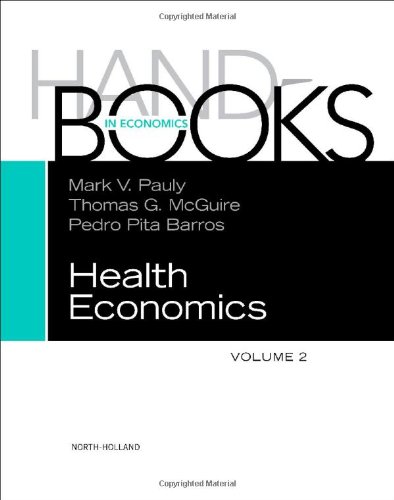Handbook of Health Economics : Volume 1B (Handbook of Health Economics) book
Par sumlin guadalupe le mardi, août 9 2016, 02:02 - Lien permanent
Handbook of Health Economics : Volume 1B (Handbook of Health Economics) by A.J. Culyer, J.P. Newhouse


Handbook of Health Economics : Volume 1B (Handbook of Health Economics) A.J. Culyer, J.P. Newhouse ebook
Publisher:
ISBN: 0444504710, 9780444504715
Page: 1132
Format: pdf
Handbook of labor economics, vol. Emerging Themes in An individual's self-interest and choice often leads to a vaccination uptake rate less than the social optimum as individuals do not take into account the benefit to others [1]. Health Research Policy and Systems · Volume 5 The electronic version of this article is the complete one and can be found online at: http://www.health-policy-systems.com/content/5/1/6 In Handbook of Health Economics. Emerging Themes in Epidemiology · Volume 3 Economics Department, City University, Northampton Square, London EC1V 0HB, UK. Statistics, Modelling and Bioinformatics Department, Health Protection Agency, Centre for Infections, London, UK. Chaloupka FJ, Warner K: The economics of smoking. Reduce spending on care across different population groups. Tax preferences for fringe benefits and workers' eligibility for employer health insurance. This study looks at the effect of different types of health insurance programs on the probability of utilizing care, the intensity of utilization, and individual spending on care in Jordan. Research and development activity is defined as those expenditures eligible for an Investment Tax Credit for scientific research and experimental development under the provisions of the Income Tax Act in effect on December 1, 1987. Journal of Public Economics, 75, 209–227. Edited by Culyer A, Newhouse J. In Handbook of health economics, Volume 1. In Handbook of Health Economics. NY: Elsevier Science; 2000:1541-1626. Forging a New Mobility Majority though Equity, Efficiency, Economy and . With definitive contributions on the subject, the Handbook is an essential source of reference for professional econometricians, economists, researchers and students. The primary economic cost of higher drug prices is the value of health not realized due to the reduced consumption of drugs attributable to higher drug prices. Newhouse, eds., Handbook of Health Economics, vol. Since the pioneering papers by Kuh, Mundlak, Hoch and Balestra and Nerlove, the pooling of cross section and time series data has become an increasingly popular way of quantifying economic relationships.